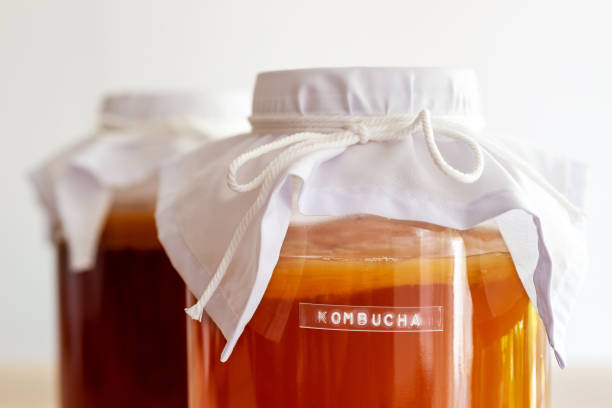Alternative Treatments, Supplements and Herbs
Does Kombucha Actually Help Your Gut
Learn the truth about kombucha: does it really heal your gut like it says it does? In recent years, this fermented tea has become more famous as a health drink, with supporters saying it might be good for your digestive health. But does kombucha really help your gut health, or is it just another health trend?
What is Kombucha?
Kombucha is a drink that is made by fermenting sweet tea with a mutual culture of bacteria and yeast (SCOBY). During fermentation, many helpful chemicals are made, such as probiotics, organic acids, and vitamins. People think that these parts help gut health by keeping the bacteria in the gut in balance and lowering inflammation.
Kombucha has been around for a very long time—thousands of years. Through China and other parts of Asia and Eastern Europe, it spread. In the past, it was eaten because it might be good for your health, like making digestion better and giving you more energy. Kombucha is now easy to find in many flavors and has become famous as a trendy health drink.

Understanding the Gut Microbiome
Before you can understand how kombucha might help your gut health, you need to know about the gut bacteria. The gut microbiome is made up of all the tiny living things that live in our gut. Microorganisms like bacteria, fungi, and viruses are very important for your health, nutrition, and getting nutrients into your body.
Inside a healthy gut, there should be a lot of different kinds of germs. While a bad diet, worry, antibiotics, and other medicines can throw off this delicate balance, it can also cause an imbalance called dysbiosis. A lot of different health issues, like stomach issues, autoimmune diseases, and mental health issues, have been linked to dysbiosis.

The Potential Benefits of Kombucha for Gut Health
People who like kombucha say that the probiotics in it can help your gut health. Live bacteria and yeasts called probiotics are good for the body, especially the gut system. Probiotics can help restore and keep the right balance of bacteria in the gut, which is important for good digestion and general health.
Also in kombucha are organic acids like acetic acid and gluconic acid, as well as bacteria. It has been shown that these organic acids can kill microbes and protect cells from damage. They can help stop the growth of bad bacteria in the gut and lower inflammation, which is often a sign of stomach problems.
Kombucha also has antioxidants that come from plants and help protect the body from free radicals and toxic stress. Oxidative stress can hurt cells and make health problems worse, like inflammation and long-term illnesses. Kombucha may help gut health and general health in a roundabout way by lowering oxidative stress.

Scientific Evidence Supporting the Use of Kombucha for Gut Health
There is some limited scientific evidence and anecdotal proof that kombucha can help heal the gut, but more research is needed to fully understand how it works. The results can be affected by things like the type and quality of the kombucha, the gut microbiome of each person, and their general eating habits.
Researchers who wrote a study in the Journal of Medicinal Food found that kombucha could kill harmful germs like E. coli and Salmonella. Food Chemistry published another study that showed kombucha had antioxidant qualities and could protect against DNA damage caused by oxidative stress.
It’s important to keep in mind, though, that many of the studies on kombucha have been done in labs or on animals. More studies with real people are needed to find out exactly how kombucha affects gut health and to figure out the best amounts to drink and how often.

How to Incorporate Kombucha Into Your Diet
If you want to add kombucha to your diet to maybe improve your gut health, here are some things you should think about. First, pick a good brand of kombucha that uses pure ingredients and a trustworthy fermentation process. To ensure the safety and quality of a brand, look for ones that are tested by a third party.
Start by adding small amounts of kombucha to your diet. If you can handle it well, slowly increase the amount you drink. Also, it’s important to know that because it ferments, kombucha has very small amounts of alcohol in it. Even though the alcohol content is usually low, it’s best not to drink too much, especially if you’re pregnant, breastfeeding, or have a past of abusing alcohol.
Potential Side Effects and Risks of Consuming Kombucha
While kombucha is usually thought to be safe for most people, it can have bad effects on some. Some people may have gut problems like gas, bloating, or an upset stomach after drinking kombucha. This might be because the drink has bacteria and organic acids in it.
Sometimes, dangerous bacteria or molds can grow in kombucha because it wasn’t prepared properly or got dirty during the brewing process. This can cause serious health problems. To keep the risk of contamination as low as possible, it’s important to follow the right steps for making and keep everything clean at all times.
Before adding kombucha to your diet, you should talk to a doctor if you have a weak immune system, are getting treatment for cancer, or have had serious stomach problems in the past.

DIY Kombucha Brewing Guide
If you’re feeling daring, you can make your own kombucha at home. Here’s a primer to get you started:
- Gather your materials, which should include a glass jar, a SCOBY, tea bags, sugar, and a permeable cloth or coffee filter.
- Bring the water to a boil and steep the tea bags according to the package directions. Stir in the sugar until it dissolves.
- Allow the tea to cool to room temperature before pouring it into the glass jar.
- Fill the jar halfway with SCOBY, cover it with a permeable cloth, and fasten it with a rubber band.
- Keep the jar in a warm, dark spot for about a week, checking on it on a regular basis.
- When the kombucha has achieved the proper fermentation level, carefully remove the SCOBY and place it in a clean container.
- Bottle the kombucha in sealed containers and allow it to go through a second fermentation to create carbonation for a few days.
- Refrigerate the bottles to slow fermentation, then drink your homemade kombucha!
Conclusion
I like the complex view on kombucha’s possible benefits for gut health that was shared after thinking about what was said. It’s a lesson that kombucha is only one part of a healthy lifestyle. It contains probiotics, organic acids, and antioxidants that can help keep your gut microbiome balanced and lower inflammation.
The fact that more study is needed shows how complicated health science is and how important it is to keep looking into things to fully understand kombucha’s effects. It is clear that each person’s circumstances can affect their results. This shows how personalized health is.
Being careful to talk to a doctor before adding kombucha to your diet makes sense, especially for people who are worried or already have health problems. It makes the point that individual health advice is very important.
As a conclusion, the thought that kombucha can be a tasty addition to a healthy lifestyle if done right seems like an open invitation to try and enjoy while keeping personal health concerns in mind. This reflection helps you think about adding kombucha to your wellness habit in a balanced and well-informed way.


